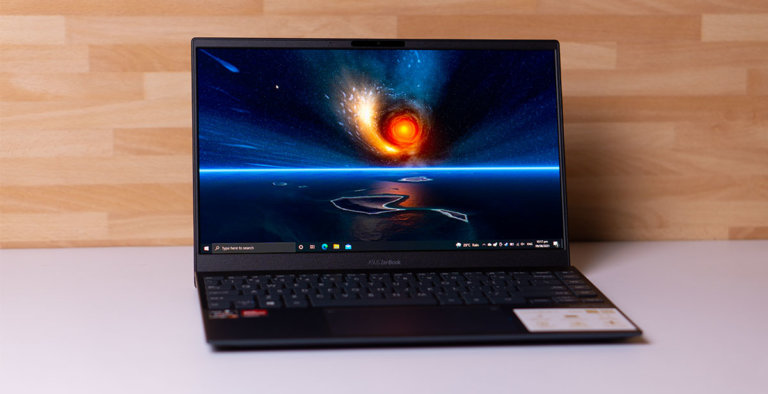
OLED panels are usually reserved for high-end ultraportable notebooks but the ASUS ZenBook 13 OLED UM325 aims to buck the trend by offering it at a midrange price. It doesn’t skimp on the internals and design either as it sports an AMD Ryzen 7 5700U and an elegant lightweight chassis.
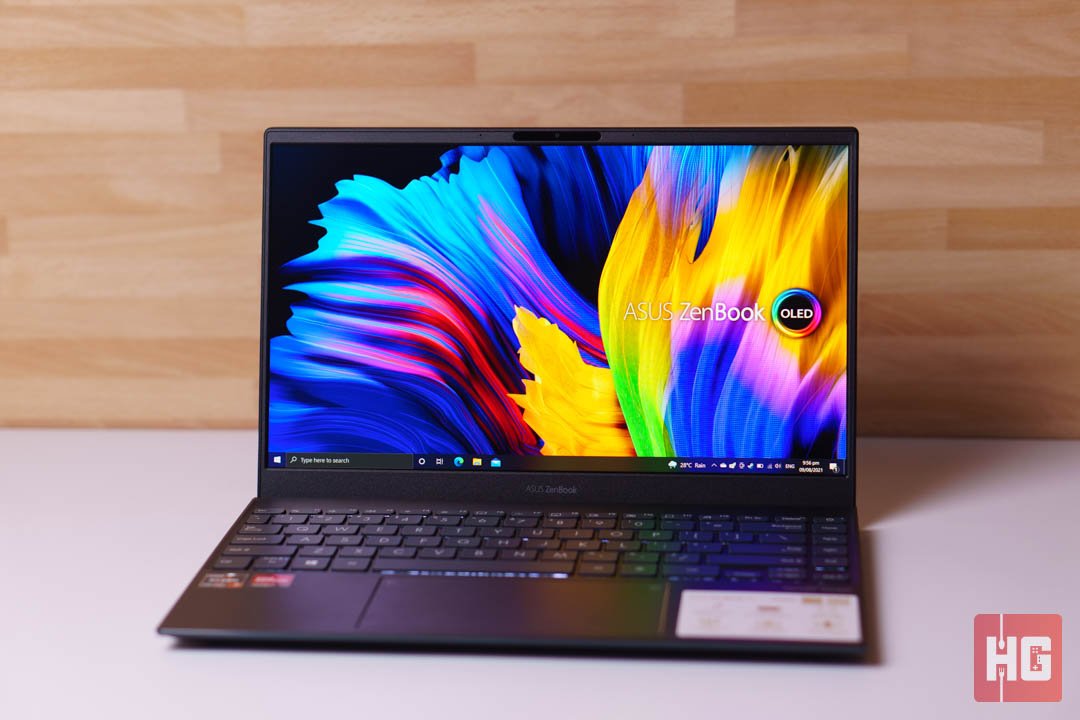
| CPU | AMD Ryzen 7 5700U |
| GPU | AMD Radeon RX Vega 8 |
| OS | Windows 10 |
| RAM | 8GB LPDDR4x 3733MHz |
| Display | 13.3-inch OLED, 1920 x 1080, up to 400nits, 100% DCI-P3, NanoEdge Bezels |
| Storage | 512GB PCIe 3.0 NVMe SSD |
| I/O Ports | 2x USB 3.2 Gen2 Type-C, 1x USB 3.2 Gen1 Type-A, 1x HDMI 2.1, 1x MicroSD Reader |
| Connection | Dual-Band WiFi 802.11ax, Bluetooth 5.1 |
| Battery | 67Whr, up to 16 hours, USB PD 3.0 (65W) |
| Audio | Harman/Kardon Audio, Smart Amp, Array Microphone |
| Others | NumberPad 2.0, Backlit Keyboard, 3D IR Cameras |
| Dimensions | 304 x 203 x 13.9mm |
| Weight | 1.14kg |

The ASUS ZenBook 13 OLED UM325 is encased in a simple box with the ASUS ZenBook branding. The notebook is placed snuggly within and comes with a USB Type-C to 3.5mm audio jack, a USB Type-A to Ethernet adapter, a 65W USB PD 3.0 charger, and documentation.

The chassis of the notebook is made out of aluminum which allows for a durable yet lightweight build at only 1.14kg. It’s also very thin at 13.9mm when it is closed. The lid has a smooth finish and have the ZenBook’s concentric circle design.

Not much can be said about the looks of the ZenBook 13 OLED UM325. It embodies the minimalism that other notebooks in the lineup strive for. It feels premium to the touch with a cold metal feel whenever we placed our hands on it.

The notebook comes with the brand’s ErgoLift hinge that raises its angle as the display mechanism is pushed further away. It increases the angle by up to 3 degrees which isn’t much but it still offers a comfortable experience when using the laptop.

Taking the centerstage is its 13.3-inch OLED display. It’s only available at 1920 x 1080 and it does not support touch inputs but it’s a gorgeous screen to experience. Blacks are incredibly deep and colors are equally vibrant. Viewing angles are a non-issue and since the bezels are trimmed down to a minimum allowing the panel to take most of the screen real-estate.

Its display is pre-calibrated and is PANTONE validated. ASUS says that it has 100% DCI-P3 color gamut and supports HDR 500. Brightness is said to peak around 500nits. A quick run of a SpyderX Pro confirms ASUS’ claims:

The ZenBook 13 OLED UM325 has an incredibly wide gamut for what can be considered a midrange notebook. The display does minutely prefer greener values but a quick calibration run should fix that. Overall, the screen will be fit for everyone even for creatives who edit color-sensitive work.
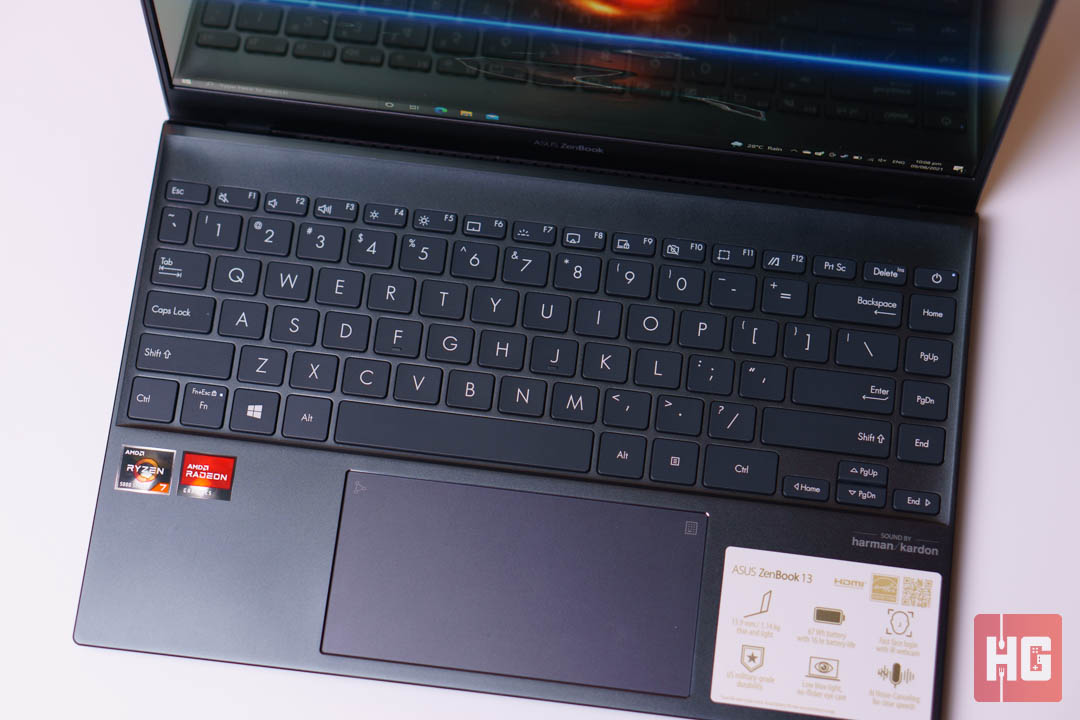
The ZenBook 13 OLED UM325 comes with an edge-to-edge scissor-style keyboard with three levels of white backlight. Tactility and travel distance are pretty decent but the design comes with some issues. ASUS has squeezed in a dedicated navigation cluster at the right-hand side – but since the notebook is so small – they have slashed the keys at the opposite side making them significantly smaller.
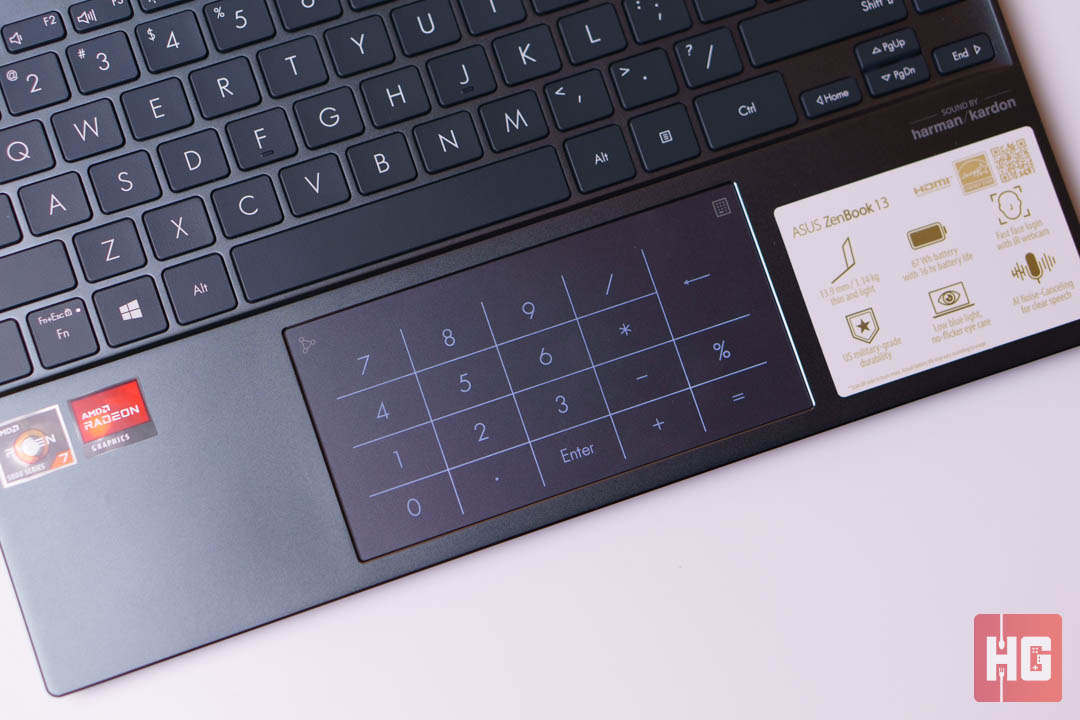
The notebook comes with a fairly wide and smooth touchpad with good tactility. The NumberPad 2.0 is integrated on the touchpad, which gives users a dedicated number pad. It’s activated by tapping its logo at the top-right of the pad. Keys are functional and you can still use the touchpad when it’s switched on.
Dongles won’t be a requirement for the ZenBook 13 OLED UM325. It has two USB 3.2 Gen2 Type-C ports and an HDMI 2.1 connection at the left-hand side. Both Type-C ports support USB PD charging and DisplayPort connectivity. Meanwhile, the opposite comes with a single USB USB 3.2 Gen1 Type-A port and a MicroSD Card reader.
There are some key omissions though like a 3.5mm audio jack for wired audio devices. The lack of Thunderbolt connectivity on the Lucienne platform may also deter some users especially those who have external GPUs for gaming.
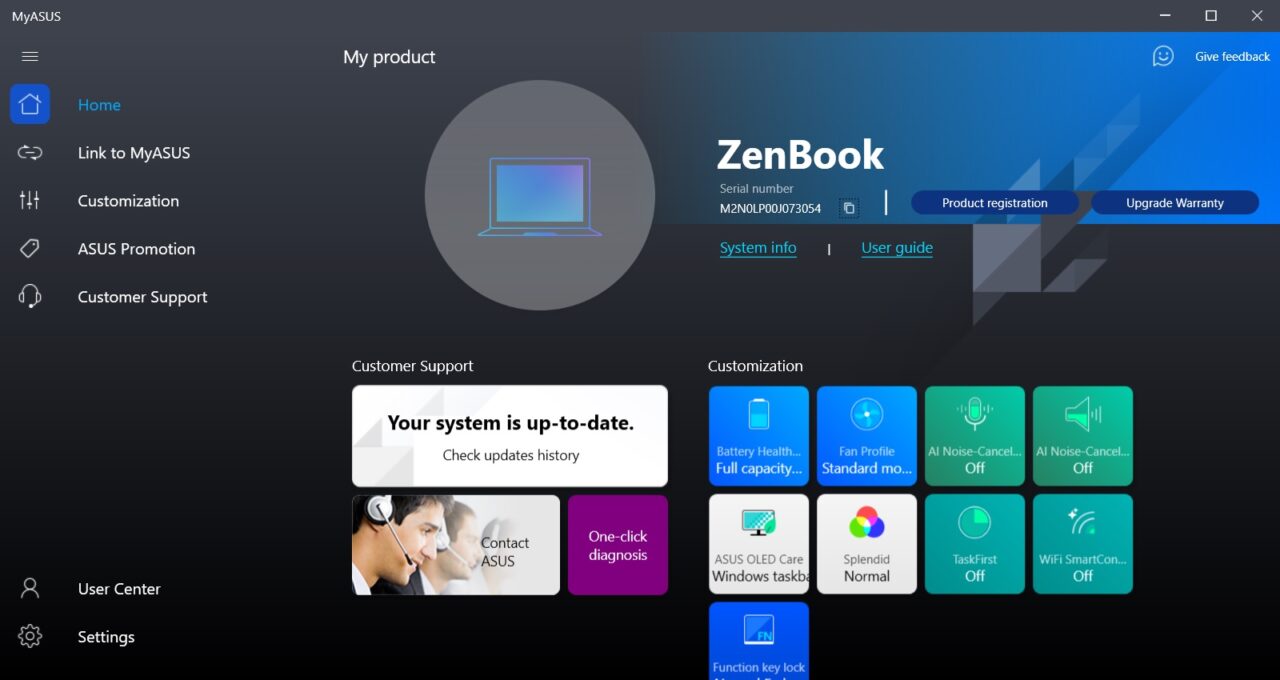
MyASUS is pre-installed on most non-ROG notebooks by default. The app allows users to adjust system settings such as fan profile, AI noise cancelling, and change the profile of the display. Battery charging levels can also be modified to increase battery longevity.

Inside the thin chassis is of the ASUS ZenBook 13 OLED UMX325 is Lucienne-based AMD Ryzen 7 5700U with 8-cores, 16-threads, and an 8-core Vega GPU. It also has 8GB of LPDDR4x RAM running at 3733MHz. We would have liked at least 16GB RAM on the notebook as its current amount of RAM is simply not enough this current year.
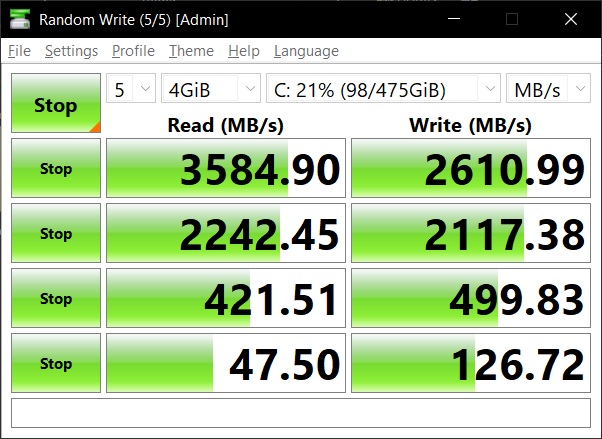
The notebook is equipped with a 512GB PCIe 3.0 x4 NVMe SSD from SK Hynix with a model number HFM512GD3JX013N. It’s advertised to deliver up to 3,500MB/s and 3,000MB/s Sequential Read and Writes speeds, respectively. A quick run of CrystalDiskMark with a 4GiB workload reveals that Sequential Read Speeds are bang on at 3,584MB/s while Sequential Write Speeds lag behind at a still relatively fast 2,610MB/s. Random 4K is pretty good as well at more than 400MB/s mark at 32 queues and at 53MB/s and 114.58 Write and Read speeds at 1 queue/1 thread.
With the benchmarks for its storage done, it’s time to move on to the bulk of the benchmarks for its APU. It will be put to the test with several programs including synthetic programs and rendering programs for the CPU and light gaming for its GPU.
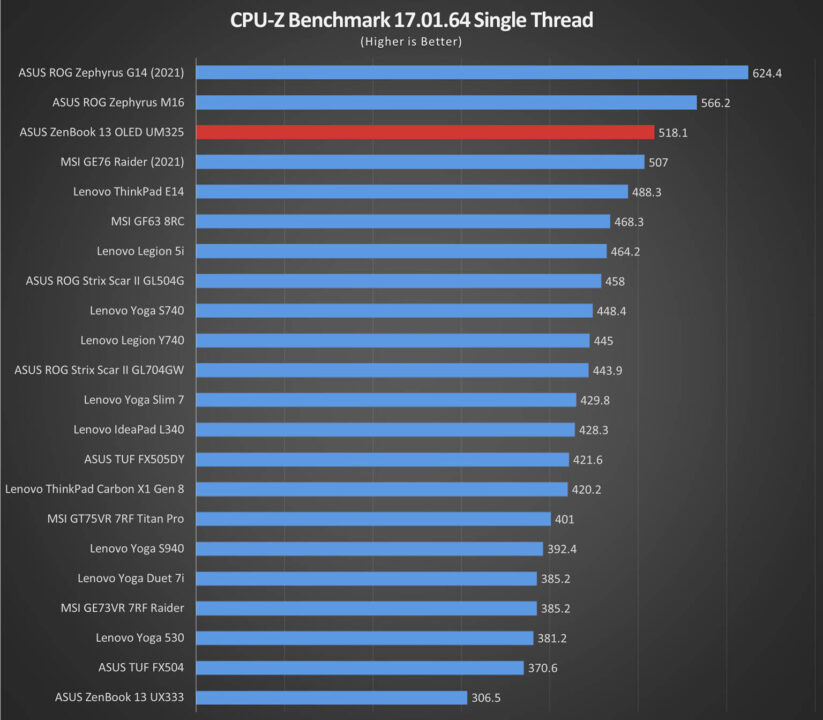

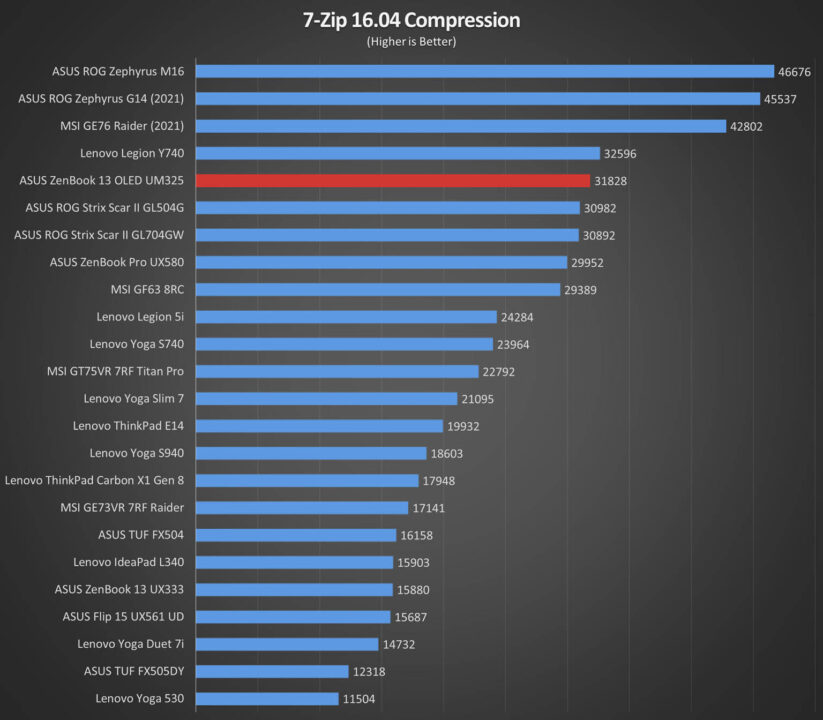
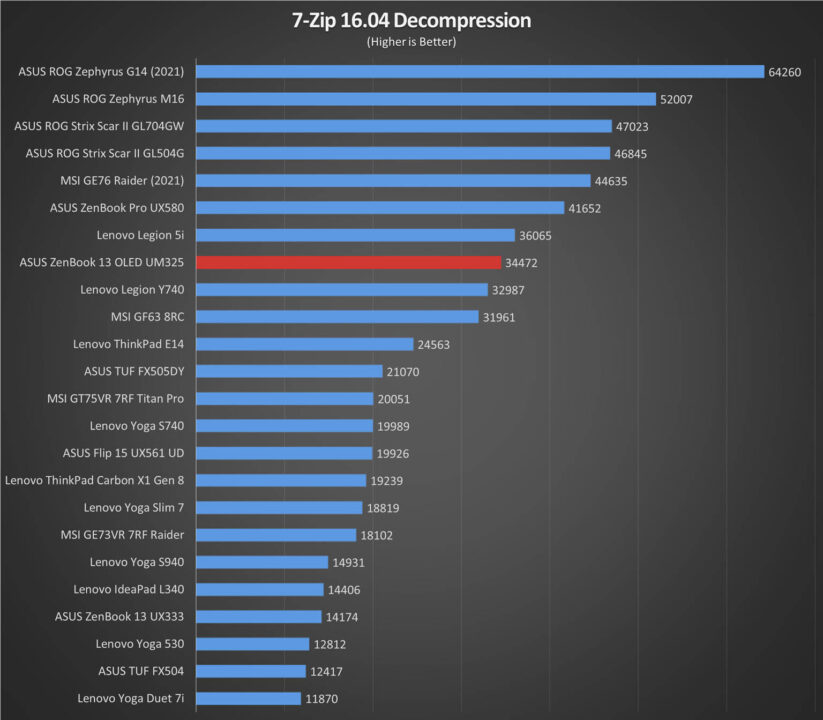
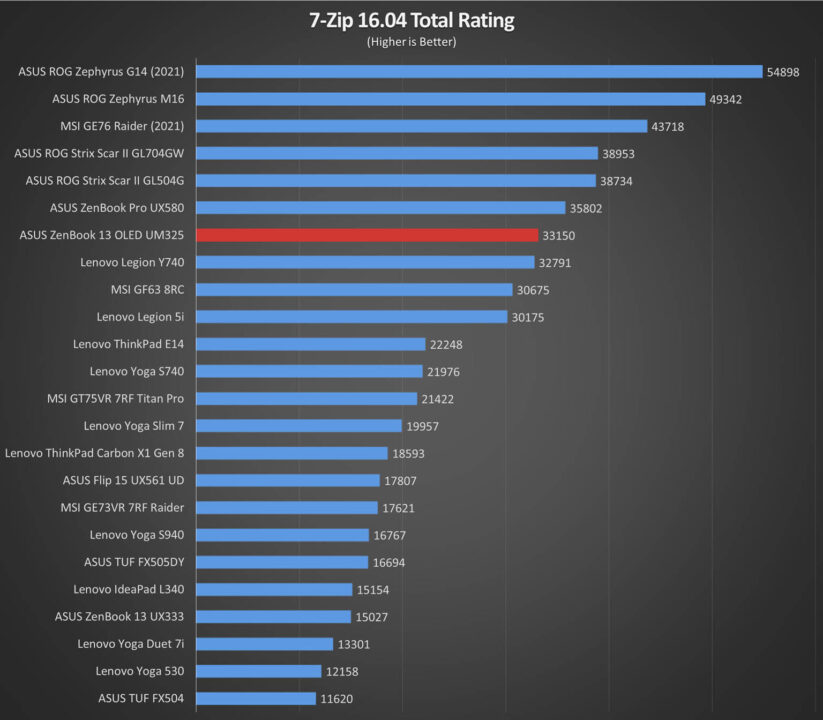
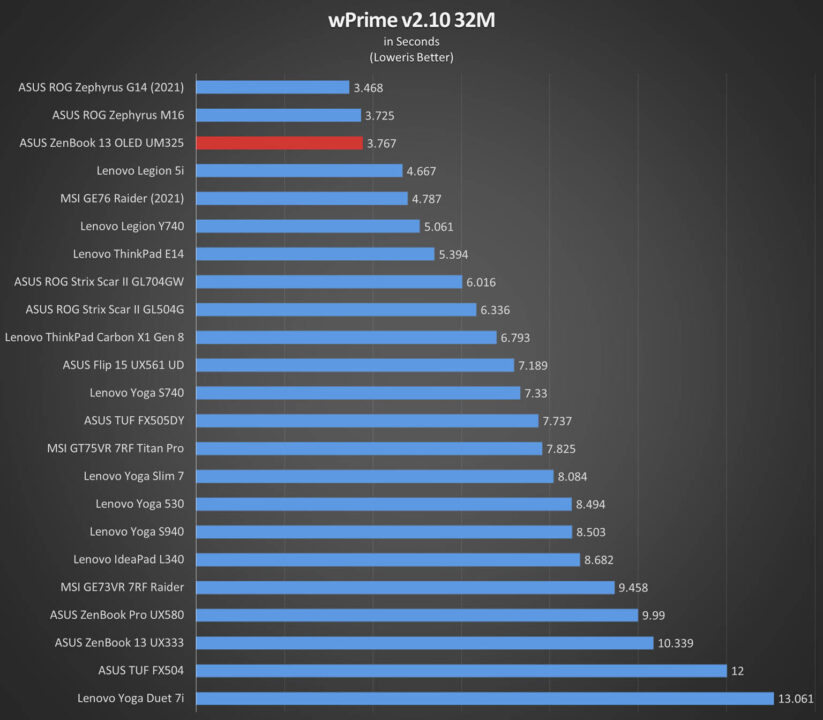


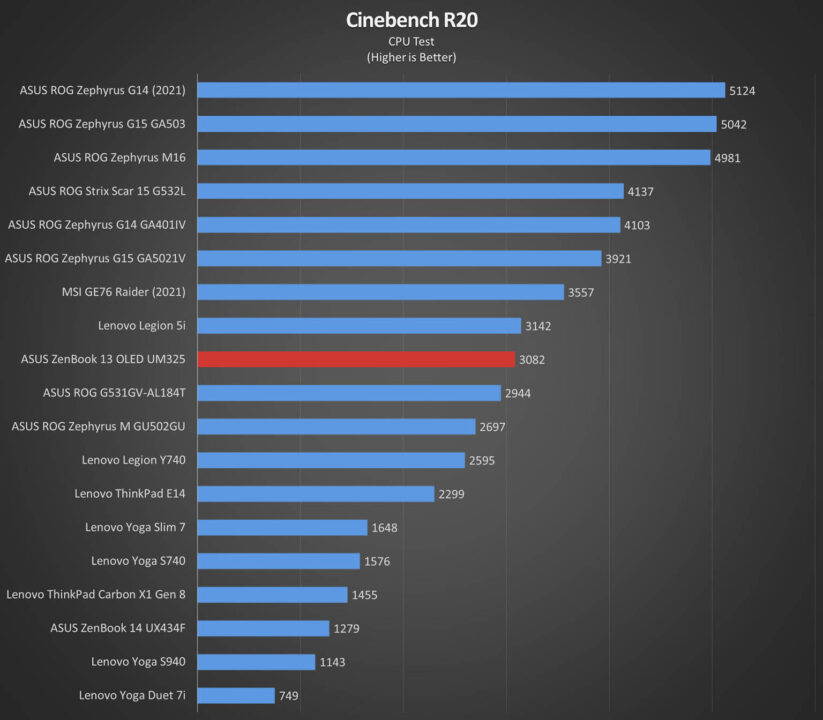
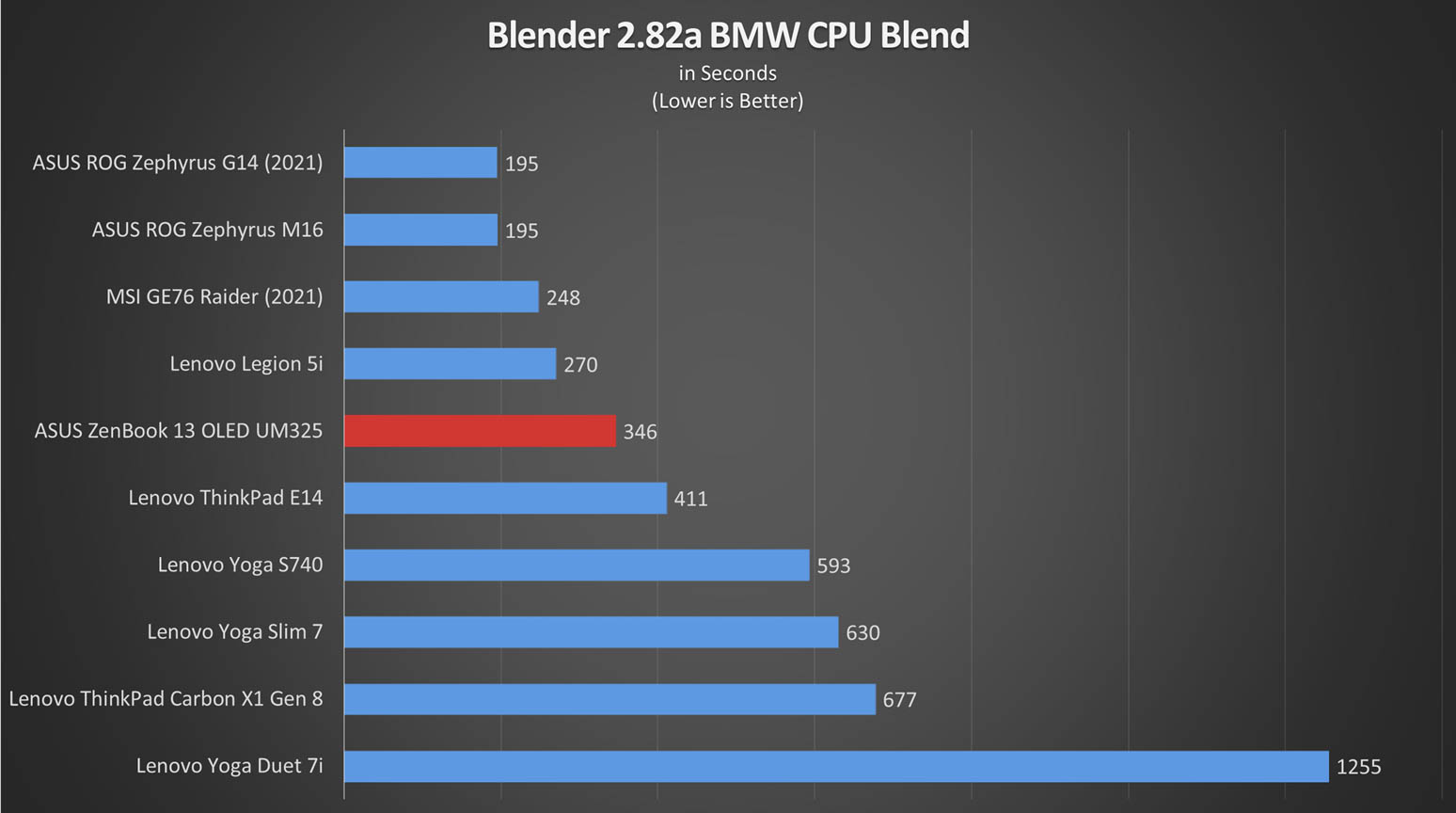
The AMD Ryzen 7 5700U found on the ZenBook 13 OLED UM325 might be based on a refreshed Zen 2 architecture, but it still packs quite a punch. CPU performance comfortably rests near the middle of the pack and even outpaces some of the older gaming laptops on the list.
Performance does taper off when it comes to longer multi-core workloads like Cinebench R20. This is due to the lower all-core boost speeds of around 2.9GHz, which we assume put in place by ASUS to keep thermals low.


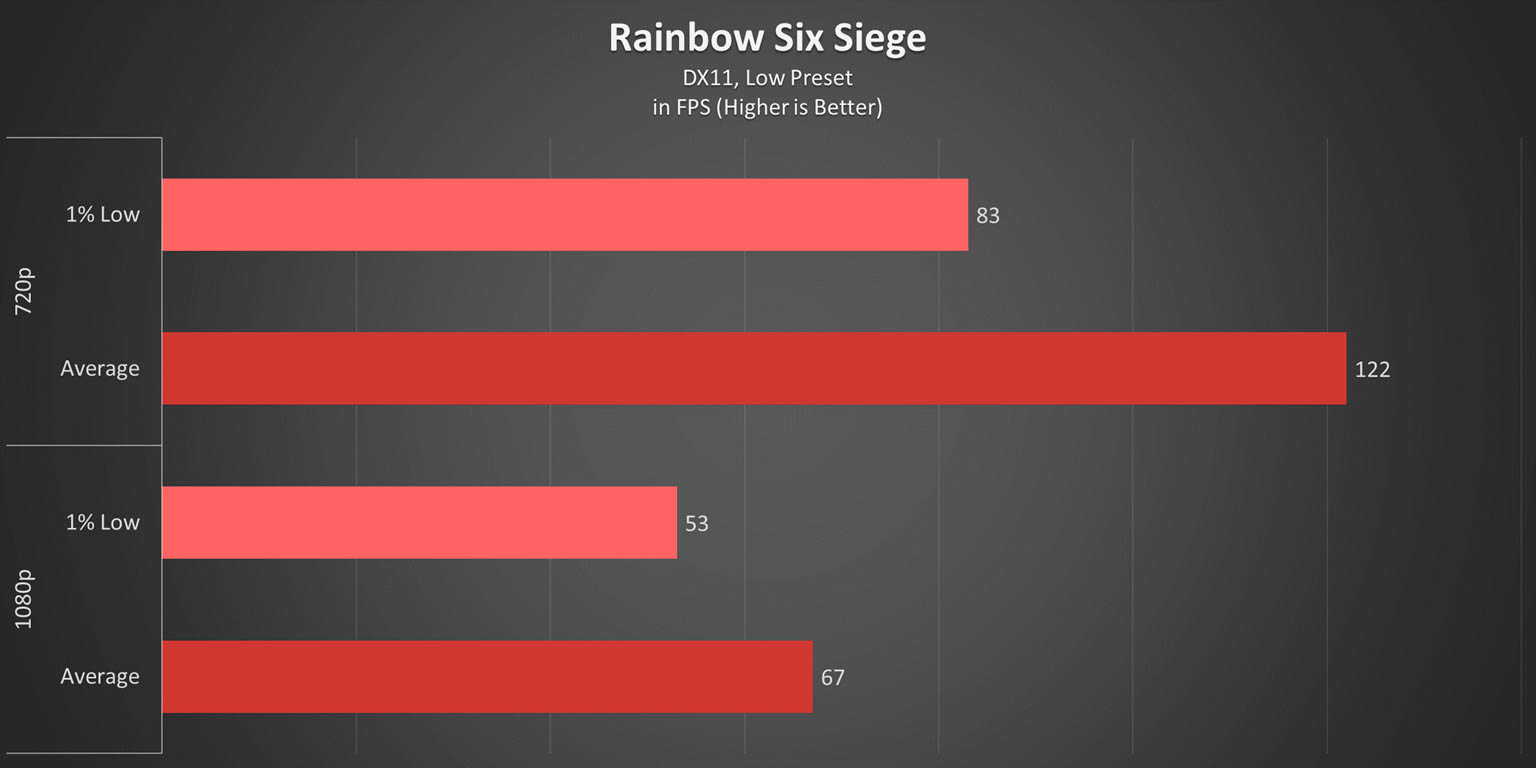
Performance for its Vega 8 GPU is pretty good given that it’s not designed for heavy gaming. Benchmarks for stock benchmarks in 3DMark are pretty poor but it will be able to deliver more than 60fps at 1080p in competitive games like Rainbow Six Siege at its lowest settings.
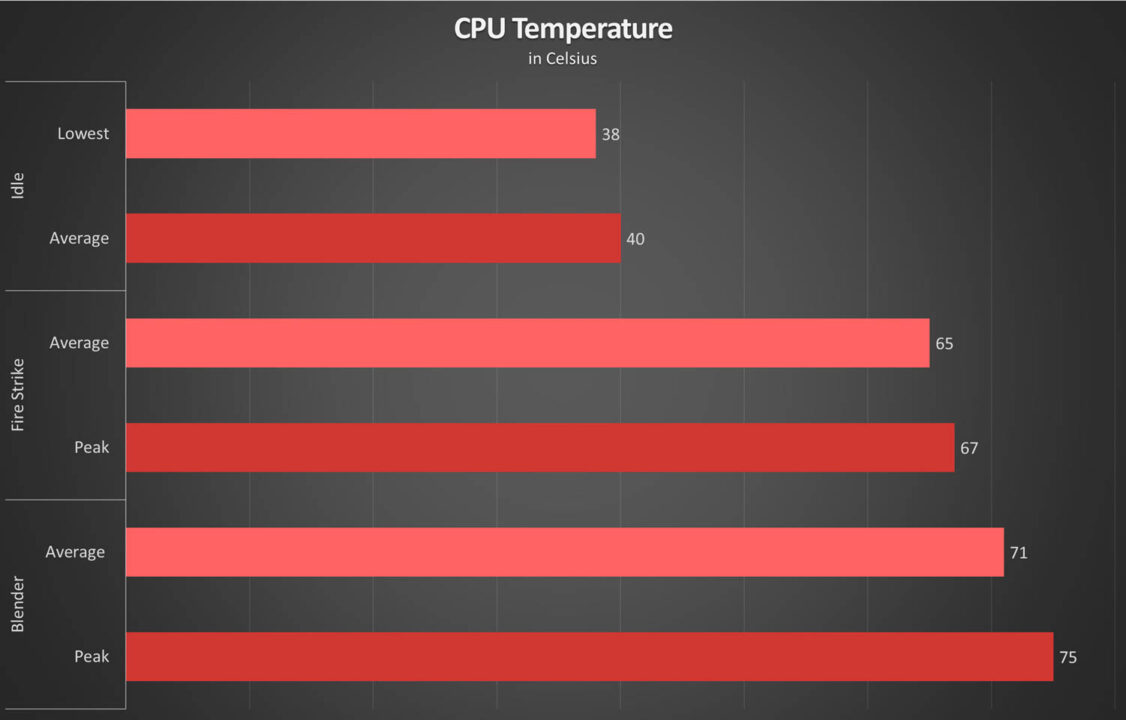
Temperatures that we measured on the ZenBook 13 OLED UM325 is pretty impressive. The 8-core, 16-thread AMD Ryzen 7 5700U rests at a comfortable 38°c when idle and only shoots up to a peak of 75°c while rendering like in Blender.

The 8-core Vega 8 GPU is on the same die as the 5700U and shares the same low temperature. It sits at only 37°c while in idle and peaks at around 65°c while running benchmarks such as 3DMark Fire Strike and Rainbow Six Siege.
While temperatures for both the APU is pretty tempered, it seems that the cooling system of the notebook has an aggressive curve. Fan noise is fairly apparent even in medium workloads. You can lower the noise, however, by turning on Quiet Mode via the MyASUS app.

A 67Whr battery powers the ASUS ZenBook 13 OLED UM325. Running a video loop test with the notebook at 50% brightness and 50% volume lasts around 10 hours, which is pretty good given that it has an 8-core CPU and an OLED panel. Charging, however, will take around an hour and 45 minutes from completely empty when charged through its 65W USB Type-C power adapter.
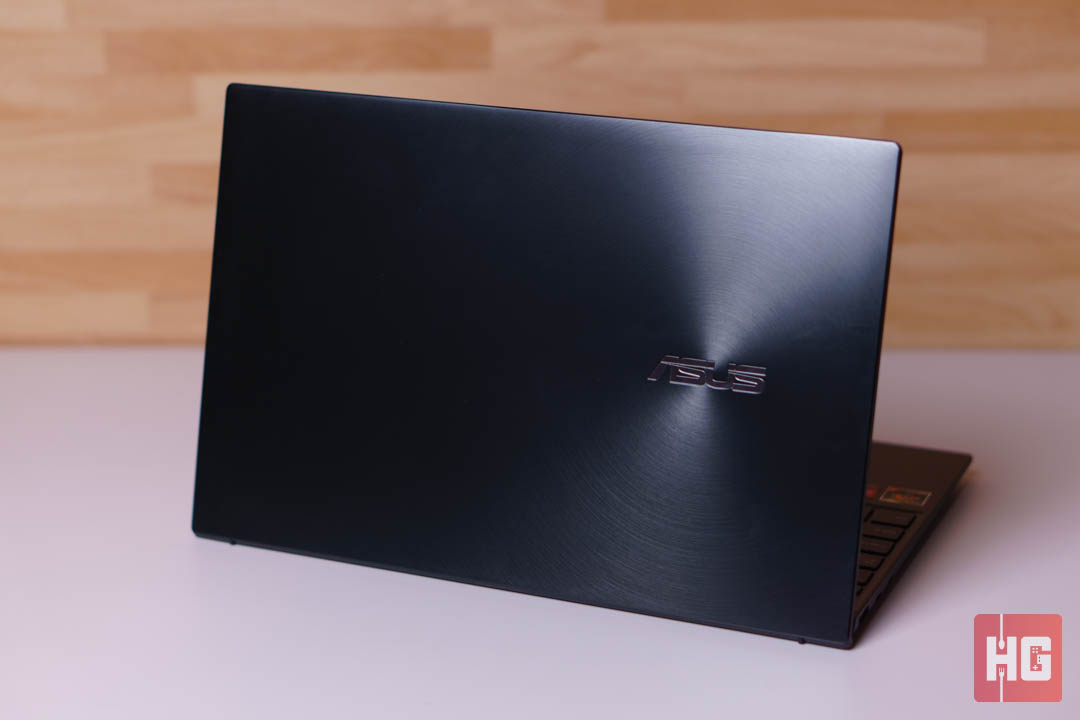
Priced at PhP 54,995, the ASUS ZenBook 13 OLED UM325 is basically a steal for what it offers: tremendous performance, a featherweight chassis, long battery life, and an amazing OLED display. You even get the brand’s trademark NumberPad 2.0 if you really miss a dedicated number pad on smaller notebooks.
It does have some minor issues, however, like the oddly-cut keyboard, the lack of support for Thunderbolt, and the lack of 3.5mm audio jack. The aggressive fan curve might also off some enthusiasts of completely silent systems.
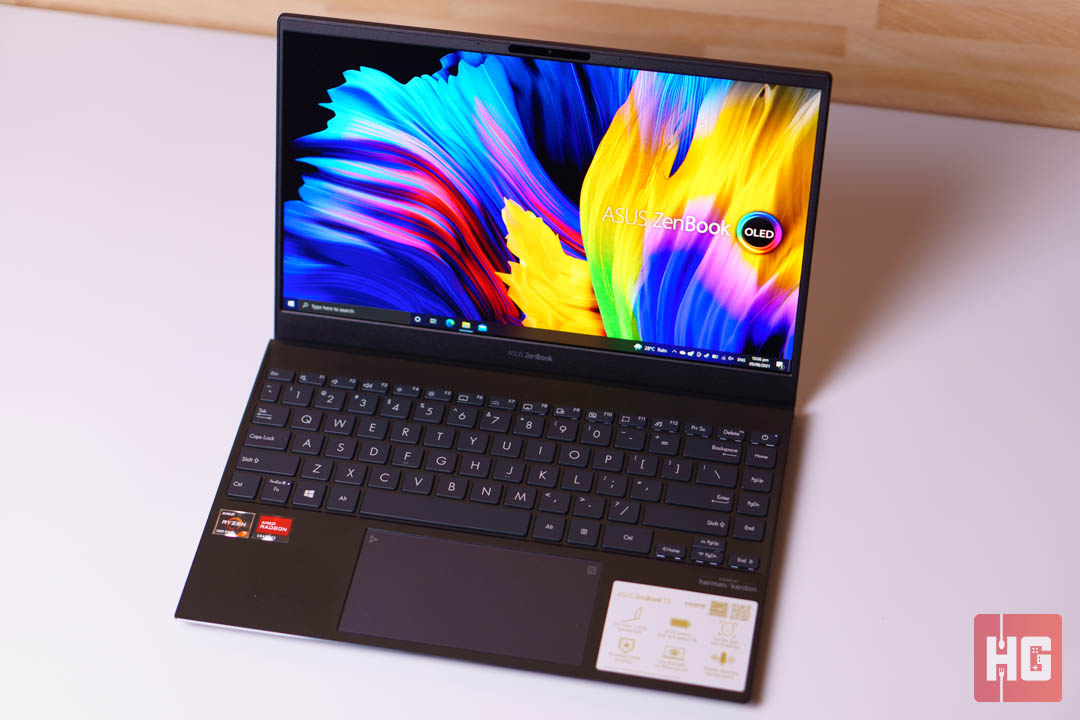
Some might also veer away from the lack of a proper Zen 3 CPU and only 8GB of RAM by default. Frankly, we still believe that its AMD Ryzen 7 5700U is perfectly competent for tasks but we would have liked if ASUS shipped it with a more RAM even if it increased the price by a smidge.

Overall though, the ASUS ZenBook 13 OLED UM325 offers excellent performance and features despite a few nitpicks. With all these reasons, we are comfortable in giving it our Seal of Approval. Those who have been looking for a proper ultrabook upgrade from the entry-level class of laptops should definitely consider this one.
The ASUS ZenBook 13 OLED UM325 is priced at PhP 54,995 and is available through the official ASUS Shopee and Lazada stores. It can also be purchased via ASUS Concept stores and authorized retail stores nationwide.
For other laptops to consider, check out our review of the ROG Flow X13, a 2-in-1 laptop. You can also check out the ROG Zephyrus M16 and the ROG Scar 17. For a more affordable gaming laptop, look out for the ASUS TUF Dash F15. If you prefer another brand, you can also check out our review of the MSI GE76 Raider here.
